
Selling large amounts of drugs like methamphetamine is still illegal. But having small amounts in Oregon is now a civil violation, subject to a $100 fine or a mandatory health screening.
April Baer / OPB
Big changes in Oregon’s drug laws take effect today.
After decades of waging a war on drugs, voters decided in November to decriminalize the possession of small amounts of everything from methamphetamines to heroin.
Under ballot Measure 110, police won’t pursue criminal charges if they find small amounts of illegal drugs on someone or in their car. Instead, that becomes a civil violation subject to a $100 fine. The person can either pay the fine or have it waived by attending a health screening.
Police and criminal justice agencies across Oregon are figuring out how to deal with the new law. Portland Police Officer Melissa Newhard thinks it may save officers time, as they can now simply write a ticket instead of taking someone to jail.
“This will be a little bit quicker, like a traffic stop,” she said. “But ... we’re still going to get these people’s names. There will be that record that they have been stopped with illegal drugs on them, whether or not they went to jail.”
Newhard said officers may spend less time working with district attorneys, as they won’t have to discuss charges.
“We wouldn’t go to court for it as we might have in the past,” she said.
Newhard said the Portland Police Bureau has no plans to reduce the number of officers on the street because of the new law. Nor does she believe Measure 110 will reduce the number of times police search people they stop or their vehicles, because law enforcement is still tasked with preventing the sale of drugs. Newhard expects it will be relatively easy to distinguish between people carrying drugs for personal use and those carrying for sale. Officers can weigh contraband if necessary.
People caught with larger amounts of drugs for sale are still subject to arrest and prosecution.
Newhard said that in her experience, a number of people have used jail time to end a drug habit. She’s intrigued to see what effect the new law will have.
“It will be interesting to see how this measure changes things, if it helps people long-term or not, or the use of drugs, or how many drugs are around,” she said.
Measure 110 requires the Oregon Health Authority to establish a 24/7 telephone addiction recovery center and an Oversight and Accountability Council to deal with all the people expected to take a health screening rather than paying civil fines for drug possession. The state health agency is contracting with Lines for Life, a nonprofit best known for its suicide prevention work, for the telephone helpline.
Many health care experts are concerned the system may be overloaded by an influx of people.
“It [Measure 110] stands up an isolated set of services apart from the rest of health care and behavioral health care systems,” Steve Allen, with the Oregon Health Authority, told a legislative committee last week. “I frankly think that’s the wrong approach. Many people who have addictions also have mental illness, physical health problems, mental problems. We think the best, strongest, most effective approach is to ensure that people who are calling into the line have access to a broad range of not only behavioral health services, including co-occurring services, but primary care services.”
Even before Measure 110 and the pandemic, Oregon was in the middle of an addiction crisis. Tera Hurst, the executive director of the Oregon Health Justice Recovery Alliance, said the pandemic is worsening the crisis. Oregon cannot afford to wait to solve this problem, she said. An average of one or two Oregonians die of a drug overdose every day.
“Recent data from the OHA shows that overdose deaths in Oregon were up 70% this spring compared to that same time last year,” Hurst said.
Proponents of Measure 110 pushed it as a way to both curb the number of people incarcerated for comparatively small-bore drug crimes and improve the state’s system for helping people with addiction recover. Under Measure 110, any cannabis tax revenue the state collects above $45 million a year goes into a new fund meant to stand up new addiction treatment centers and to offer grants to bolster services in existing organizations. The measure said the new fund must receive at least $57 million in its first year, but backers expect the real amount to be well above that.
Gov. Kate Brown has suggested delaying the financial side of Measure 110 until July 2022. Lawmakers will consider that concept when they look at the governor’s proposed two-year budget during the ongoing legislative session.
